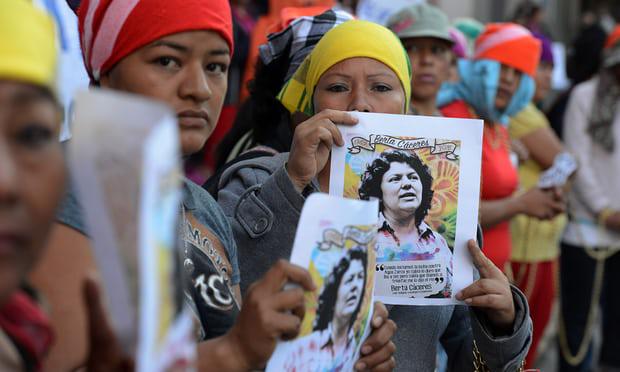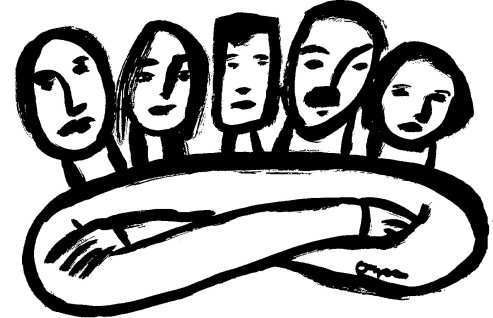Written by Shivalika Srivastava
Edited by P. Dharma Teja
 Source: Orlando Sierra/AFP/Getty Images
Source: Orlando Sierra/AFP/Getty Images
“They threaten you so you shut up. I can’t shut up. I can’t stay silent faced with all that is happening to my people. We are fighting for our lands, for our water, for our lives.”
-Jakeline Romero, Colombian land defender[i]
A safe and healthy environment is the basic requirement for every human being. The enjoyment of other rights like right to life, right to water and right to health require a livable environment, without which human existence is not possible. However, due to the various developments and activities of humankind, this environment is polluted. Today, we are confronted with the problems of global warming, climate change, polluted water and air and in all a misbalance in the ecosystem. The actions of industries like mining, logging and agribusiness industry have contributed in polluting the environment to a great extent. Construction of dams, dumping of toxic waste in water bodies and emission of CO2 and other hazardous gases are some of the examples which have led to the depletion of the environment.
Steps were needed to be taken in order to prevent any further harm to the environment. There are individuals who had recognized this urgent need to save and protect “our” environment and stood up to take some action against the activities of the industries which can harm it. All such individuals who exercise their human rights in order to protect the environment are the environmental defenders. They exercise their right to freedom of speech, freedom of assembly, freedom of association and freedom to participate in decision-making to protect the environment. Since these individuals act as the guardians of the environment which is the basic necessity of humans, they are also referred to as human rights defender.
 Source: www.avrupa.info.tr
Source: www.avrupa.info.tr
However, such environment defenders who stand against the strong and influential industries face the risk being pressurized by ways of blackmail and tortured, which can even to go an extent of being killed. More specifically, according to Hina Jilani, the former UN Special Representative on Human Rights Defenders, human rights defenders working on natural resources and land rights are the second-largest group of human rights defenders at risk of being killed.[ii] In the recent years, there have been many incidents of death of the environmental defenders. For instance, the co-founder of the Council of Indigenous Peoples of Honduras (Copinh) and a Goldman Environmental Prize awardee Berta Cáceres was shot dead by gunmen who entered her home in La Esperanza. The Honduran indigenous and environmental rights campaigner was killed barely a week after she was threatened for opposing a hydroelectric project.[iii]
In 2016, at least 200 land and environmental defenders were killed. This has been stated as the deadliest year on record. According to a report, not only is this trend growing, but also spreading. As compared to 16 in 2015, the killings were dispersed across 24 countries in 2016. However, with many killings unreported, and even less investigated, it is likely that the true number is actually far higher.[iv] The Global Witness’ research into 35 countries shows that between 2002 and 2015 more than 1100 Environmental Defenders have been killed. In 2015, this number reached an average of 3 killings per week in the researched countries. Most victims come from Central and South America and almost 40% of the victims belong to indigenous groups.
In such a scenario, the question arises is that what measures can be taken to safeguard their rights?
 Source: http://stmedia.startribune.com
Source: http://stmedia.startribune.com
The environmental defenders are more often the indigenous people. They get involved in the environmental struggles accidentally while defending their own lands, forest and water from polluters, land grabbers, miners, and loggers. The indigenous environmental defenders are on the frontlines. They are confronted with large-scale agriculture, dams, mining and logging taking place in their own ‘backyard’. If they are provided with proper opportunities and resources, they can contribute enormously in the wellbeing of the environment as they witness the extraction of natural resources and know how it results in the pollution and destruction of their living environment. This pollution and destruction lead to violations of human rights of the environmental defenders, violating their right to life, to health, to water, to privacy and uninterrupted family life and to a clean and healthy environment. Destruction and pollution furthermore can result in forced displacement, food scarcity and increased conflict among the communities living in the affected territory. Henceforth, they play a pivotal role in defending the environment. The Special Rapporteur on Human Rights Defenders, Michel Forst said thus: “The fulfilment of the international community’s commitment to the protection of the environment is premised on the empowerment of environmental defenders. The goals of a more sustainable, prosperous and equitable future – set out, for example, in the 2030 Agenda for Sustainable Development – are doomed to failure if the individuals and groups on the frontline of defending sustainable development are not protected at the national, regional and international level”.[v]
However, environmental defenders are particularly vulnerable due to their often-limited knowledge and awareness about their rights and the lack of information on how to claim them. It is the duty of the state to safeguard the rights of the environmental defenders and to provide them with aid. There are international laws to govern and regulate the activities which cause any hindrance to the exercise of human rights of these defenders. Reference can be made to the international human rights framework such as the 1982 World Charter for Nature, International Covenant on Civil and Political Rights, the Universal Declaration of Human Rights and the United Nations Conference on the Human Environment which were enacted to protect the human rights of all the individuals, including the environmental defenders. The major declaration passed with respect to the environmental defenders is the UN Declaration on Human Rights Defenders & the Special Rapporteur which officially recognized environmental defenders and the related issues. Indeed, the international legal framework show a promising face. However, proper implementation of these laws is needed. The state, the multinational companies and others need to unite and fight against the evil faced by the environmental defenders.
 Source: http://humanrightshouse.org
Source: http://humanrightshouse.org
To conclude, the cry for help from all the environmental defenders shall not be ignored. Today, dealing with the environmental issues is necessary. However, combating the problems of these defenders is equally important because saving an environmental defender means saving our environment.
END NOTES
[i] Global Witness interview with Jakeline Romero (15 May 2017).
[ii] Implementation of General Assembly resolution 60/251 of March 2006 entitled “Human Rights Council”, Report submitted by the Special Representative of the Secretary-General on Human Rights Defenders, Hina Jilani A/HRC/4/37, paragraph 45,
http://www.humanrights-defenders.org/wp-content/uploads/2010/04/G0710417-UNSRHRD2007HRC.pdf
[iii]The Guardian, https://www.theguardian.com/world/2016/mar/03/honduras-berta-caceres-murder-enivronment-activist-human-rights
[iv] Global Witness statistics from 2016.
[v] Report of the Special Rapporteur on the situation of human rights defenders Michel Forst, transmitted to the General Assembly by the Secretary-General at the 71st session on the promotion and protection of human rights, A/71/281, p. 4 & 27.
Advertisements Share this:




![IMG_20180111_095703_749[1]](/ai/065/578/65578.jpg)